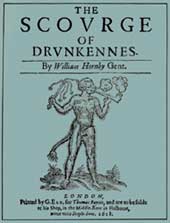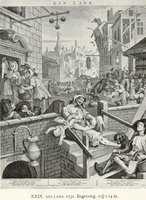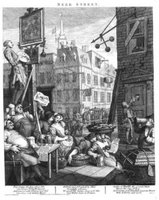Here, of course, we see the other use to which the 18th amendment is consistently put: as a generic example of regulating something which clearly should not be regulated. Now, let me be clear, I think prohibition was a terrible idea, and it did lasting harm to our country both in giving support to criminal organizations that continue to exist to this day, and in destroying much of our native brewing heritage.

However, I think that writing off our country's misguided experiment with prohibition as "the zeal of certain Calvinists to ban alcohol" represents an excessive simplification which fails to do justice to the history involved.
The story of Prohibition really goes back a good hundred and fifty years before its ratification in 1919 (not coincidentally, only a year before the ratification of the 19th, giving women the right to vote). Gin was invented in the 1600s, and became wildly popular in Britain in
 the mid seventeen hundreds. Gin was domestically produced, and thus not subject to import tariffs, it could be manufactured using grain that was too low quality for beer production, and thus it was incredibly cheap. This availability of cheap distilled spirits came at the same time as the tumultuous beginnings of urbanization and industrialization, and the result was that by 1740 gin production was six times that of beer, which given the relative strengths of the two drinks suggested obvious problems. Beer was a healthful drink (more so than water, since boiling killed bacteria and fermentation kept more from coming) while gin was a fast way to forget your troubles. William Hogarth's Gin Lane (left) and Beer Street
the mid seventeen hundreds. Gin was domestically produced, and thus not subject to import tariffs, it could be manufactured using grain that was too low quality for beer production, and thus it was incredibly cheap. This availability of cheap distilled spirits came at the same time as the tumultuous beginnings of urbanization and industrialization, and the result was that by 1740 gin production was six times that of beer, which given the relative strengths of the two drinks suggested obvious problems. Beer was a healthful drink (more so than water, since boiling killed bacteria and fermentation kept more from coming) while gin was a fast way to forget your troubles. William Hogarth's Gin Lane (left) and Beer Street  (right) engravings underscore moral reputation of each drink.
(right) engravings underscore moral reputation of each drink.As urban areas exploded in the late 1700s and throughout the 1800s both in Europe and in the fledgling United States, massive alcoholism (on a scale which can scarcely be imagined now) became a major social scourge in slums crammed with recent immigrants, those who had recently moved from the country into the city, the poor, and the unemployed. With gin (and whiskey and rum) soaked slums came crime, violence, and domestic abuse, not to mention chronic unemployment.
In response to all this, a temperance movement sprang up (you see some of this in Dickens, though he was by no means a supporter of complete tea tottling) which first sought to encourage temperance, and later began to push for total abstinence. There was certainly a religious element to this, but in some ways the religious argument against drinking was played up to support the social desire to cut down on drunkenness -- very few Protestants condemned all consumption of alcohol prior to 1700, and few enough had a problem with it as of 1800. Beer and wine especially were generally seen a innocent table drinks.
As a political force, the push to legally ban all alcohol in the United States grew alongside the other great 19th century progressive movements of abolitionism and women's suffrage. Temperance was in many ways seen as a women's issue, since spousal abuse often went along with excessive drink. And somewhere along the way the desire to ban alcohol separated from the need to do so. By the time the 18th amendment went into effect, after World War I, the gin alleys and oppressive slum conditions of the 1840s had vanished for mostly economic reasons. Poor neighborhoods were still desperately so by modern standards, and drinking was still chronic among some groups within those neighborhoods, but conditions were not anywhere near as bad as they had been eighty years before. Perhaps, to be cynical, it only became feasible to ban alcohol nationally because there was no longer such a massive problem with alcohol consumption.
Whatever the reason, prohibition was unquestionably a disaster.






1 comment:
Yes, the temperance movement was largely supported by women in the United States and Britain. As for prohibition, this measure was seen as the height of progressivism at the time. Many who read this and similar blogs will be familiar with Chesterton's The Flying Inn, just to illustrate the point.
Post a Comment